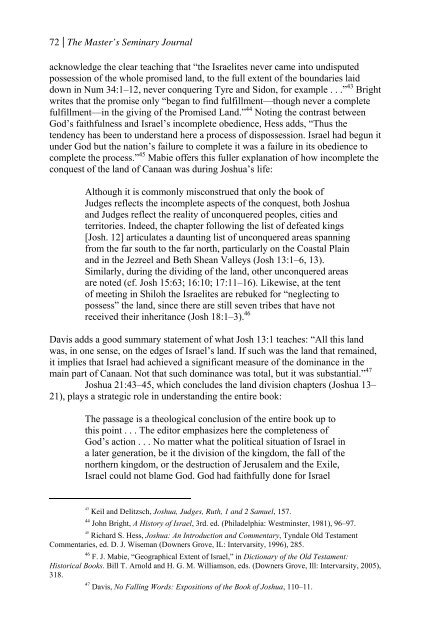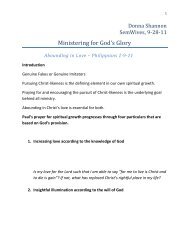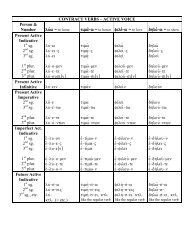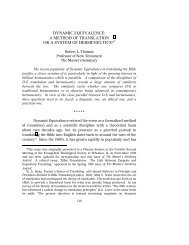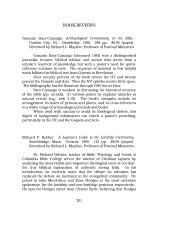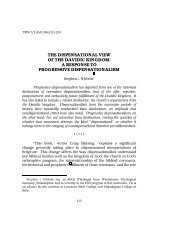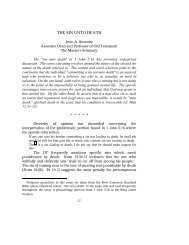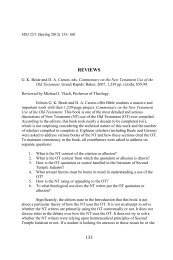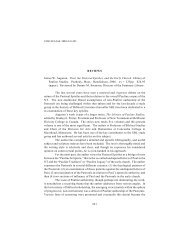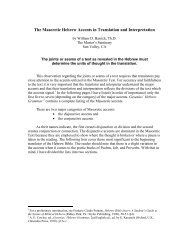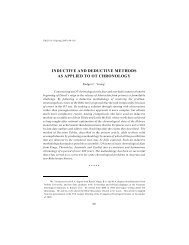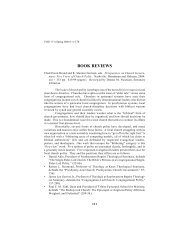Did God Fulfill Every Good Promise? - The Master's Seminary
Did God Fulfill Every Good Promise? - The Master's Seminary
Did God Fulfill Every Good Promise? - The Master's Seminary
You also want an ePaper? Increase the reach of your titles
YUMPU automatically turns print PDFs into web optimized ePapers that Google loves.
72 | <strong>The</strong> Master’s <strong>Seminary</strong> Journalacknowledge the clear teaching that “the Israelites never came into undisputedpossession of the whole promised land, to the full extent of the boundaries laiddown in Num 34:1–12, never conquering Tyre and Sidon, for example . . .” 43 Brightwrites that the promise only “began to find fulfillment—though never a completefulfillment—in the giving of the <strong>Promise</strong>d Land.” 44 Noting the contrast between<strong>God</strong>’s faithfulness and Israel’s incomplete obedience, Hess adds, “Thus thetendency has been to understand here a process of dispossession. Israel had begun itunder <strong>God</strong> but the nation’s failure to complete it was a failure in its obedience tocomplete the process.” 45 Mabie offers this fuller explanation of how incomplete theconquest of the land of Canaan was during Joshua’s life:Although it is commonly misconstrued that only the book ofJudges reflects the incomplete aspects of the conquest, both Joshuaand Judges reflect the reality of unconquered peoples, cities andterritories. Indeed, the chapter following the list of defeated kings[Josh. 12] articulates a daunting list of unconquered areas spanningfrom the far south to the far north, particularly on the Coastal Plainand in the Jezreel and Beth Shean Valleys (Josh 13:1–6, 13).Similarly, during the dividing of the land, other unconquered areasare noted (cf. Josh 15:63; 16:10; 17:11–16). Likewise, at the tentof meeting in Shiloh the Israelites are rebuked for “neglecting topossess” the land, since there are still seven tribes that have notreceived their inheritance (Josh 18:1–3). 46Davis adds a good summary statement of what Josh 13:1 teaches: “All this landwas, in one sense, on the edges of Israel’s land. If such was the land that remained,it implies that Israel had achieved a significant measure of the dominance in themain part of Canaan. Not that such dominance was total, but it was substantial.” 47Joshua 21:43–45, which concludes the land division chapters (Joshua 13–21), plays a strategic role in understanding the entire book:<strong>The</strong> passage is a theological conclusion of the entire book up tothis point . . . <strong>The</strong> editor emphasizes here the completeness of<strong>God</strong>’s action . . . No matter what the political situation of Israel ina later generation, be it the division of the kingdom, the fall of thenorthern kingdom, or the destruction of Jerusalem and the Exile,Israel could not blame <strong>God</strong>. <strong>God</strong> had faithfully done for Israel43Keil and Delitzsch, Joshua, Judges, Ruth, 1 and 2 Samuel, 157.44 John Bright, A History of Israel, 3rd. ed. (Philadelphia: Westminster, 1981), 96–97.45Richard S. Hess, Joshua: An Introduction and Commentary, Tyndale Old TestamentCommentaries, ed. D. J. Wiseman (Downers Grove, IL: Intervarsity, 1996), 285.46 F. J. Mabie, “Geographical Extent of Israel,” in Dictionary of the Old Testament:Historical Books. Bill T. Arnold and H. G. M. Williamson, eds. (Downers Grove, Ill: Intervarsity, 2005),318.47 Davis, No Falling Words: Expositions of the Book of Joshua, 110–11.


